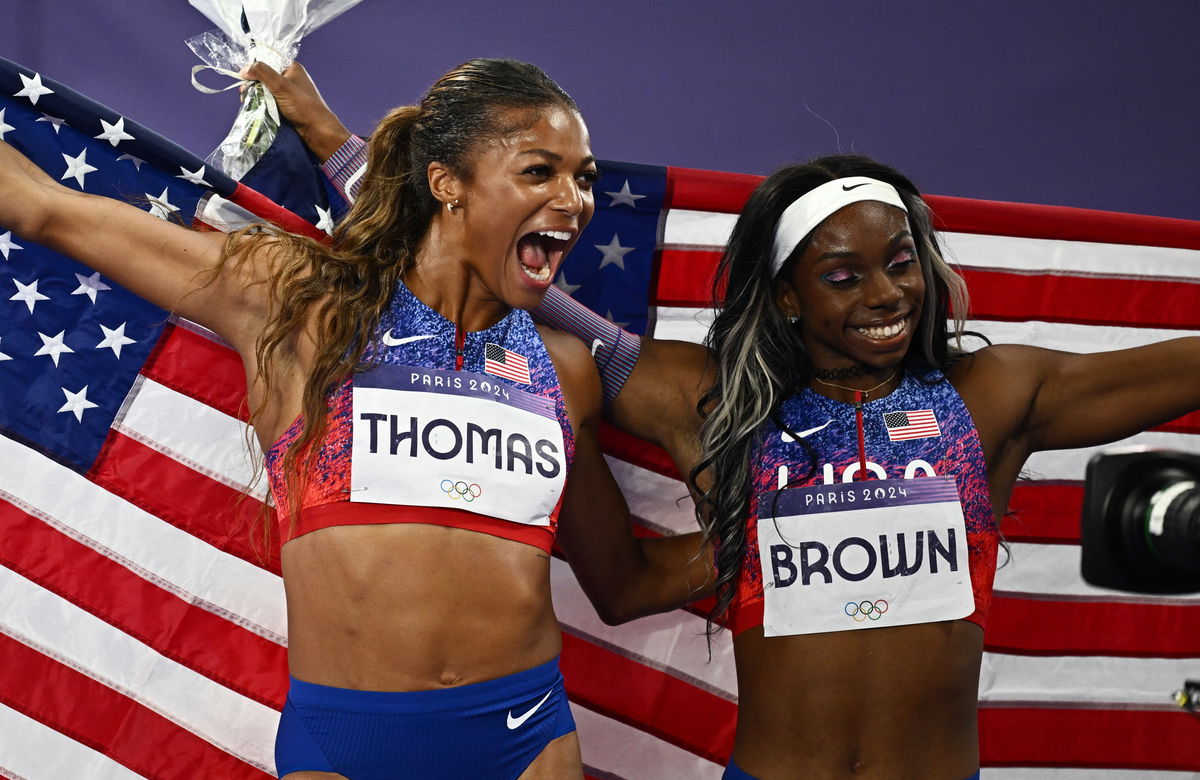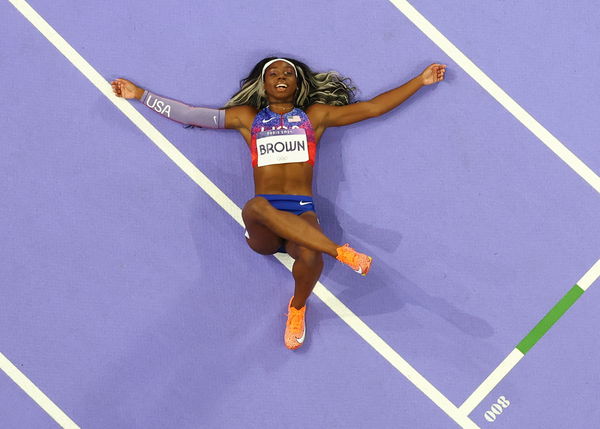
Reuters
Paris 2024 Olympics – Athletics – Women’s 200m Final – Stade de France, Saint-Denis, France – August 06, 2024. Gabrielle Thomas of United States celebrates with her national flag after winning gold with bronze medallist Brittany Brown of United States. REUTERS/Dylan Martinez

Reuters
Paris 2024 Olympics – Athletics – Women’s 200m Final – Stade de France, Saint-Denis, France – August 06, 2024. Gabrielle Thomas of United States celebrates with her national flag after winning gold with bronze medallist Brittany Brown of United States. REUTERS/Dylan Martinez
She stood on the Lausanne track last week with a win in hand, yet a cloud of dissatisfaction followed her. The 30-year-old American sprinter, who has battled a serious health condition in recent years, ran through wet Swiss rain in Laussane Diamond League to cross the line first in the women’s 200 meters. Yet, instead of celebration, Brittany Brown’s exchange with journalists left her voicing irritation and disappointment.
Watch What’s Trending Now!
Gabby Thomas’ training partner has lived the past two seasons in a balancing act, navigating the physical toll of endometriosis while pursuing consistency on the world stage. Brown, now six months removed from surgery, clocked 22.23 in Lausanne, just off her season best, defeating Nigeria’s Favour Ofili and Côte d’Ivoire’s Marie-Josée Ta Lou-Smith. “I am proud of how I ran today, the weather was not easy, but I executed well,” she said. “Consistency has been my focus, and I expected to see the results here after the work I’ve put in!”
ADVERTISEMENT
But the victory did not resolve a central frustration: The Olympic bronze medalist is not qualified for next month’s World Championships in Tokyo as she came fourth in the USA Track and Field Championships 2025. When asked about it, the tension surfaced. “I didn’t make the World team,” she told an interviewer after the race, the response blunt and matter-of-fact. She later took to her X account to criticize the lack of preparation she felt from those covering the event. “I have to come to the track and do my job and I feel like if you’re a journalist in the mixed zone, I expect the same out of you just basic research, better questions. Where’s @theinsidelaneuk @realtalkwithtee @CitiusMag help ME.”
Brown’s irritation was not only about the selection but also the way her journey was covered. The past two years have seen her describe in detail the impact of endometriosis, a chronic illness marked by pain and fatigue. In Lausanne, she reflected on her recovery, noting, “I’ll be six months post-op on Monday. So, post-op after any surgery, even a surgery specific to that has been very hard and very trying. Your body’s going through a lot of changes. And I’m healing as like a normal woman, but I’m also trying to compete as a professional athlete.”
ADVERTISEMENT
She added that she still faces difficult races but remains determined. “I’m not going to have the best results every single time, but I chose my body. I chose to take care of my body and do my sport. So I’m here doing that.”
ADVERTISEMENT
I have to come to the track and do my job and I feel like if you’re a journalist in the mixed zone, I expect the same out of you just basic research, better questions 😂
Where’s @theinsidelaneuk @realtalkwithtee @CitiusMag help ME
— Brittany Brown, OLY (@brittanyshamere) August 20, 2025
For Brittany Brown, Lausanne was a reminder of both progress and limitation. The performance showed her ability to remain among the world’s best despite obstacles, but the absence of a place on the World Championship roster stung.
She admitted, “To say that it hasn’t affected me would be a lie… I’m still a competitor, so there is a part of me that’s like, I want to win. I want to be there, doing what I can do.” That duality, victory on the track, frustration off it, was the image she carried away from Switzerland.
ADVERTISEMENT
And amid all these conversations, we cannot help but remember how Brittany Brown has been vocal about her health struggles. After winning Olympic bronze in the 200 metres, she used her podium moment to speak openly about living with endometriosis and to dedicate her achievement to women facing the same struggle.
ADVERTISEMENT
Brittany Brown turned Olympic bronze into a powerful voice for women with endometriosis
Brittany Brown’s bronze medal in the 200 metres at the Paris Olympics carried a weight far beyond sport. Standing on the podium at her first Games, the 29-year-old American sprinter chose to frame her achievement not as a personal triumph but as a statement of solidarity. Fighting tears, she addressed a group far larger than the stadium audience.
“To all the women who have health problems, to all the women suffering from endometriosis, SPOK (polycystic ovary syndrome)… I’m with you, because I’m one of you.”
ADVERTISEMENT

Reuters
Paris 2024 Olympics – Athletics – Women’s 200m Final – Stade de France, Saint-Denis, France – August 06, 2024. Brittany Brown of United States celebrates after winning bronze. REUTERS/Fabrizio Bensch
Her remarks brought attention to the private struggle she has lived alongside her athletic career.
Earlier in the season, Brown had revealed that she suffers from endometriosis, a chronic and often debilitating condition that affects millions of women worldwide. The illness can cause intense pain, fatigue, and fertility challenges, yet it frequently goes unrecognized. By naming her condition on the Olympic stage, Brown created space for other athletes and women who feel invisible within medical and sporting circles. She explained that many have written to her saying that coaches and systems ignore their difficulties, and she deliberately used her moment to affirm their reality.
ADVERTISEMENT
Brittany Brown’s podium finish came in a race dominated by her compatriot Gabrielle Thomas, but for her, the third place represented something more profound than competition. “I’m so grateful to have been able to be an example, to be able to be here, to live this moment and be useful,” she exclaimed.
The medal, then, became both a reward and a platform: Proof of what she could achieve despite her condition, and a reminder that her story belongs not solely to herself but to those who recognize their own struggle.
ADVERTISEMENT
ADVERTISEMENT
ADVERTISEMENT